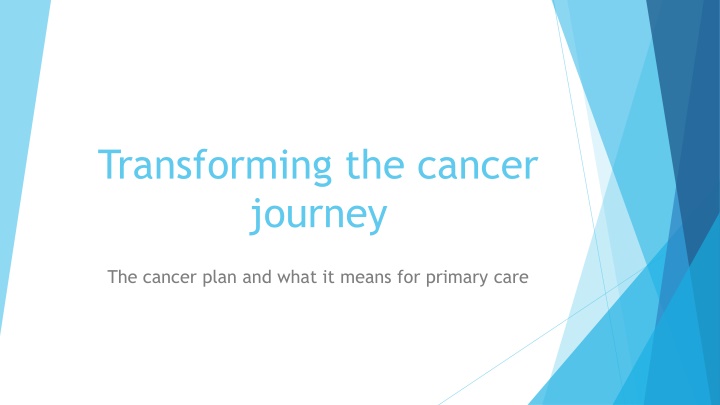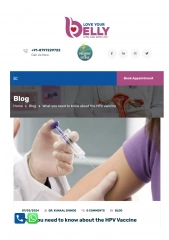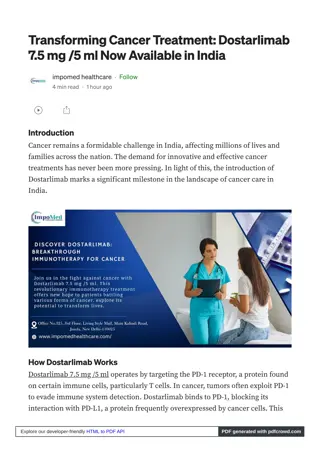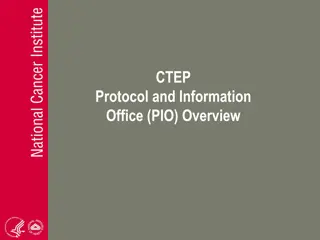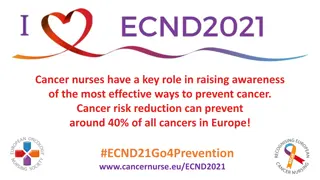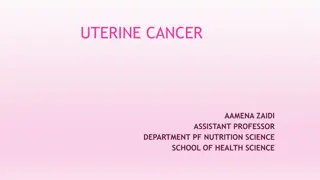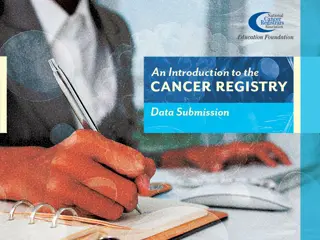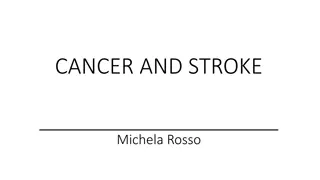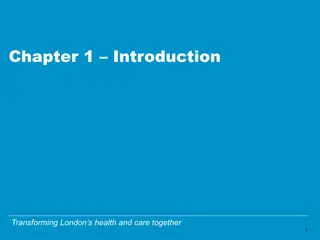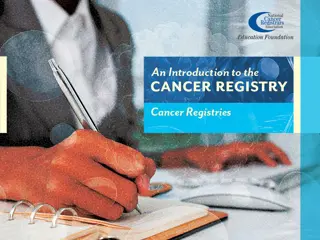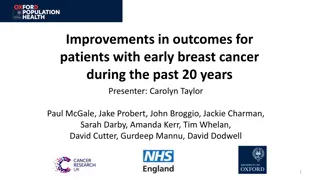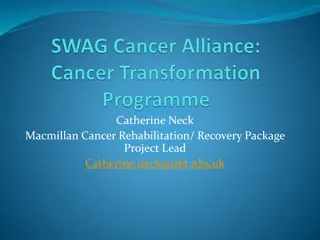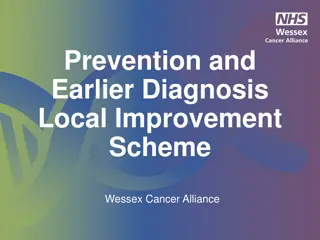Transforming the Cancer Journey: The Cancer Plan and Priorities
he need for a cancer plan, focusing on performance, demography, and world-class outcomes. Understanding the cancer transformation plan's initiatives, priorities, and early diagnosis strategies to improve cancer care in primary care settings. Resource packs and support for promoting preventive strategies, screening programs, and early cancer detection in the community."
Download Presentation

Please find below an Image/Link to download the presentation.
The content on the website is provided AS IS for your information and personal use only. It may not be sold, licensed, or shared on other websites without obtaining consent from the author.If you encounter any issues during the download, it is possible that the publisher has removed the file from their server.
You are allowed to download the files provided on this website for personal or commercial use, subject to the condition that they are used lawfully. All files are the property of their respective owners.
The content on the website is provided AS IS for your information and personal use only. It may not be sold, licensed, or shared on other websites without obtaining consent from the author.
E N D
Presentation Transcript
Transforming the cancer journey The cancer plan and what it means for primary care
Why do we need a plan? Demography Ageing population -47% can expect to get a cancer Earlier diagnosis/better treatment half will survive at least 10 years. By 2030 4 million patients living with and beyond cancer Success story but 1/3 have long term consequences of diagnosis/treatment
Cancer transformation plan National Board- strategic- originator of plan Cancer Alliances (regional) (cf previous networks) Seeking funding and will choose projects and monitor (via diagnostic and other boards) Cancer Steering group CCG, secondary, primary care Working group- focussing on role of primary care and resources
Priorities PREVENTION, SCREENING,EARLY DIAGNOSIS Recovery Package Re stratification of follow up breast/bowel/prostate ALSO patient experience metrics Notion that money will be saved by transformation to further improve services
Early Diagnosis Primary care to become more proactive in Promotion of healthier lifestyle as primary prevention. Awareness of screening uptake and promotion of national programmes Symptom awareness campaigns NICE guidance and the 2 week wait Reducing late presentation ? Direct access to diagnostics Management of vague symptoms 4 weeks to treatment target by 2020
How can we help? Resource packs distributed to practices in South and Central Birmingham and Solihull Macmillan/CRUK practice visits ( part of this year s incentive scheme in Solihull) Review practice cancer profile on PHE Fingertips Look at easy, sustainable ways to promote preventive strategies and screening programmes Look at resources to support early diagnosis of cancer Raise awareness of developments in cancer rehabilitation
4 cancers in 10 are preventable Reduce alcohol Eat fruit and veg High fibre diet Sunscreen Exercise Reduce intake processed meat Keep a healthy weight Stop smoking Healthy lifestyle message- but public not so aware of cancer prevention, Same factors aid recovery!
Screening Bowel, breast, cervix (and soon some targeted screening?) Variations in uptake relating to deprivation ethnicity learning difficulty first language mental illness On the horizon- bowelscope/fit test
Earlier diagnosis Symptom awareness ( publicity campaigns) Willingness to present Access to appointment Continuity 2ww criteria Atypical/vague sx and repeated consultation
Late Diagnosis: CRUK study 278 lung or colorectal cancers (emergency presentation) CRUK study Emergency presentation of 278 lung colorectal cancer Most at risk: elderly, carers, philosophical (? Mental illness, learning difficulty) Beware vague sx, persistent new sx, atypical sx, symptom noise. Care with safety netting, communication investigations (false reassurance/lost reports)
The Recovery Package Begins at diagnosis Holistic Individual Care Plan, patient centred Operates across hospital and primary care Approaches cancer as a long-term condition, like diabetes Aims to enable patient to live a full life with and beyond cancer
The Cancer Journey (present model) Diagnosis cancer care review in primary care Treatment Discharge..Then?
At discharge from treatment... Patients report initial elation... Then, often Anxiety/ fear (especially of recurrence) Fatigue, low mood Isolation and a sense of abandonment Difficulty getting back to normal Problems with relationships and work Need for information
The Recovery Package Earlier diagnosis & referral Secondary Care: At diagnosis: a holistic assessment/care plan More care shared with primary care Treatment Discharge holistic needs assessment/summary care plan/health and well being event
Holistic Needs Assessment Patient-led Leads to individual care plan Aim is to assess at diagnosis and discharge and between if needed Mainly hospital based so far. Use of ipads to collect data Feedback- focuses consultations without opening can of worms
Which Clinician? In hospital, multidisciplinary. (and ipads!) GPs can quickly learn process.... but Mac trained nurses are starting to carry out cancer care reviews in primary care using the holistic needs assessment/care plan This format is also suitable for annual review required on the stable prostate pathway.
Restratified follow up For breast, bowel, prostate cancers Earlier discharge of low risk patients Rehabilitation, then . supported self management as with other long term illnesses. Careful pathway redesign (safety-netting) Resistance to change?
Transformation Resources Willingness to change Willingness to work across existing boundaries Better communication/sharing of care Skill mix ..huge potential gain for patients!
Family and Friends... What journey would we choose for them?
